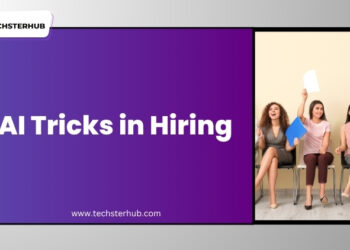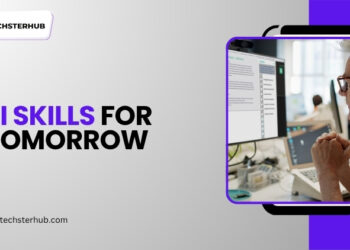Introduction
For once, artificial intelligence (AI) is not another pipe dream, it is actively transforming industries, job descriptions and skills worldwide. From predictive analytics in healthcare to automation in manufacturing and generative technologies in creative industries, AI is quickly emerging as a vital source of productivity and creativity. For the UK workforce, it’s not if AI will transform the way we work, but are employees, employers and policymakers ready for the AI transformation?
This wide-ranging report considers trends and their impact for the UK as AI market take-up increases: Drawing on recent research, Government initiatives and expert projection, it sets out the skills needed, the industries that are affected the most and the steps that need to be taken to ensure that the UK can compete in the AI-enabled global economy.
The Current State of Adoption of AI in the UK
The UK is one of Europe’s largest AI Markets with investment in AI startups exceeding 3.5 billion pounds in 2024 according to Tech Nation. Many businesses ranging from finance to healthcare to logistics to retail are combining machine learning, automation and natural language processing to become more efficient while identifying new revenue streams.
Banks, insurers and (multinational) retailers are spearheading the field, but SMEs are not far behind. Public policies like the National AI Strategy and the AI Sector Deal have been created to fund and support AI research, education and commercialisation. Yet, ubiquity raises an important question: is the UK workforce prepared to work in an economy where AI is integrated into daily work?
Opportunities AI Brings to the UK Workforce
Productivity Gains
AI promises to make those repetitive tasks easier and make things more efficient, taking unproductive workers off the hands. For example, in the logistics industry, AI forecasting will facilitate the supply chain; in the healthcare sector, AI will help physicians by automating the administrative tasks as well as lessening the diagnostic capabilities.
Creation of New Patterns of Employment
Far from fear of large-scale unemployment, AI will also generate jobs which have never before existed. Demand is increasing for data scientists, AI ethicists, machine learning engineers, prompt engineers for generative models, etc. To this end, new occupations are being created as firms deploy intelligent systems – like AI project managers and AI policy analysts.
Enhanced Decision-Making
AI helps to form faster decisions based on data. Marketing teams are using predictive analytics to personalise campaigns and financial institutions are using AI to identify fraud in real time. These applications have the effect of promoting the value of human judgment and not merely collecting data manually.
Challenges Confronting the UK Workforce
Skills Gap
The first is the skills shortage. It is estimated by the World Economic Forum that by 2027, 50% of the world’s total workforce will need to be reskilled or upskilled. There is currently a shortage of AI and data-related experts in the UK but just as important is the need for digitality skills levels across the board of roles. It is important for workers to understand how to work with AI tools, making sense of what they output, while ensuring that their work is ethical.
Job Displacement
Automated we face loss of certain menial jobs. Manufacturing, retail and administrative support jobs are most at risk. These combined effects may result in job loss and poor economic stability in the UK if copious sections of the workforce are left unskilled and unprepared for future work opportunities through retraining initiatives.
Regional Disparities
The South East and London are still centers for technology investment, and other parts of the region are likely to get left behind. If not addressed through policy, economic divisions could become more pronounced with disparities in access to training and education, broadband infrastructure, and high-tech jobs and opportunities.
Ethical and Legal Constraints
The complex issues of privacy, bias and transparency that come from using artificial intelligence Workers need education on how to use AI responsibly, and employers must establish mechanisms for data protection, AI accountability, and fair AI decision-making.
Sector-Specific Impact
Finance and Professional Services
In the UK, banks are leaders in the adoption of AI, with organization wide programs to detect fraud, assess risk, and create customized banking services for its customers. The work team should be transformed from technical knowledge to the regulatory knowledge.
Healthcare
AI helps in diagnostic; it helps in triangle of patients and also helps in the efficiency of the operations. Doctors and nurses need to learn to interpret AI-generated recommendations, while at the same time providing a trustworthy and secure platform that does not violate patient privacy.
Manufacturing and Supply Chain Management
Production lines and warehouse processes are becoming more automated and through the use of robots. Intelligent machines will require workers with advanced technical training to operate, maintain, and program the machines.
Education
Presenting a challenge for the education sector itself to incorporate AI literacy into its curriculum and train the next generation of professionals to work in an AI-enhanced work environment.
Preparing the UK Workforce for the AI-Driven Economy
1. Upskilling and Reskilling
Hence, there is a national emphasis on lifelong learning. Apprenticeships and other programmes, such as Skills Bootcamps, should be expanded for AI, data analytics and cloud computing. Employers can work with universities and distance learning schools to provide ongoing professional development.
2. Simply incorporating AI blinders into the youngest Educational Levels
Schools and colleges need to cover AI basics like data ethics, algorithmic thinking and coding in the core curriculum. In terms of its internal dynamics, the early exposure means that upcoming workers tapped the source of the workforce with the benefits of knowing about AI in the first place.
3. Government and Political Assistance
Initial results suggest that the UK government’s National AI Strategy is ambitious, but whether it succeeds will depend on ongoing financial support for regions that have introduced skills development plans and incentives for employers to invest in skills and workforce development.
4. Employer Responsibility
Companies implementing AI must offer formal training, clearly communicate their plans for automation, and make it clear how these fits with people’s careers. Instead, to reduce anxiety and resistance, it can be helpful to build the trust and commitment to develop your employees.
5. Emphasising Soft Skills
While technical know-how is essential, creativity, critical thinking, emotional intelligence and ethical reasoning are still the purview of humans. Nevertheless, employers and educators should develop these skills in a way that complements AI.
The Role of Collaboration
Preparing the UK workforce for the AI revolution will require collaboration between government, industry and educational institutions, and between working people themselves. Public-private partnerships can be used to develop training pips and apprenticeships; Universities can work with businesses to create a course that meets real-world needs.
Trade unions and professional associations can lobby for social policies related to just transition and protection of workers.
The Future: Seeing Things Clearly
AI is going to significantly transform the UK economy, but whether it is a force for good or bad will be determined by what we do now. With strong investment in education, a strong policy foundation, and a commitment to ethical AI practices, the UK can become a global leader in AI adoption while protecting its workers.
By helping employees take ownership of their learning, AI will give them a stronger creative edge and adapt their roles rather than replace them. Employers that will not use AI as a tool for human enhancement rather than cost reduction, will attract and retain talent.
Conclusion
The AI revolution is not a mirage – it is a reality. The UK workforce is at a crossroads: Rise to the challenge of AI or be left behind by global competition. With a focus on upskilling, ethical implementation, and inclusive policymaking, the UK can ensure that AI serves as a force for sustainable growth and improves working conditions for all.
The preparedness of the UK workforce will decide whether or not AI will prove a force for shared prosperity or a driver for inequality. As AI and human potential work together, a future of work arrives based on the human need for collaboration, expectations of proactive human and organizational investment and a human-centered approach to technology.











